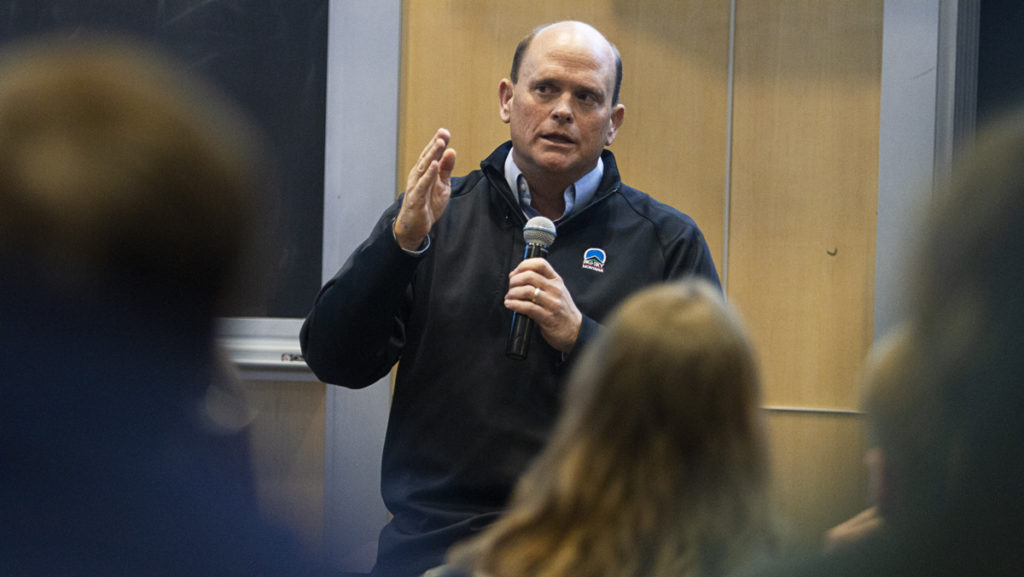U.S. Rep. Tom Reed (R-NY), who represents Ithaca within New York’s 23rd District, spoke to approximately 50 members of the Ithaca College and Ithaca community at the college April 11 about a slew of political topics, from rising college tuition to the Green New Deal.
The event was hosted by the Ithaca College Republicans. Sophomore Michael Deviney, programming director of IC Republicans, said the organization invited Reed to provide a different perspective to the college, which is a predominantly liberal institution. In the past, the IC Republicans have received criticism from the campus community for bringing speakers like Larry Pratt, a gun rights activist, to campus.
Reed said he graduated from law school with more than $100,000 of student debt. This, along with his concern about the increasing cost of higher education, was what inspired him to develop initiatives like the Reducing Excessive Debt and Unfair Costs of Education (REDUCE) Act, which requires colleges with endowment funds in excess of $1 billion to use at least 25 percent of their investment gains to reduce the costs of attendance for students from middle– and working–class families. Reed said at the event that he thinks higher education institutions are focusing on reducing costs for low–income students, but not enough for working families.
“I’ve been traveling around the country and to different institutions and really trying to ask the question ‘Why are the costs so high?’” Reed said. “One of the things that we’re finding is that a lot of institutions will tell me they have to charge this amount of cost because they have to provide every bell and whistle to the students that come on their campuses in order to attract the students to these universities and colleges.”
Reed said he disagrees with state programs like New York’s Excelsior Scholarship, which allows students with a combined federal adjusted gross income of less than $110,000 or less to attend a SUNY or CUNY school tuition-free. He said this is because the programs are funded using state funds and tax income, which means that, in reality, these programs are not free.
“The states have to pay that, current taxpayers have to pay that and the taxpayers of tomorrow have to pay that,” Reed said. “If we’re going to end at K to 12, now K to 16, essentially where it sounds like it’s going, what are you going to do about post-grad, and what are you going to do to contain those costs?”
Dave Maley, director of public relations at the college, said he did not think Reed’s comments related to Ithaca College.
“The tuition costs for Ithaca College are driven by the college’s efforts to invest in providing the highest quality student educational and residential experience while also keeping that experience as affordable as possible for students and their families,” Maley said.
After Reed’s brief talk about the issue of high education costs, the floor opened up to questions from the audience about topics attendees were concerned about. Some of these questions came from members of Sunrise Ithaca, the college’s chapter of the Sunrise Movement that advocates for making climate change a priority across the U.S. Though two members, sophomore Sophie Becraft and senior Michael Moritz, asked Reed about his thoughts on how to create and maintain a more sustainable economy, they felt like these questions were not answered.
“I think that he gave some of the classic politician responses that really didn’t get anywhere,” Becraft said. “I don’t think we changed his mind. He definitely didn’t change our minds, but I think we just need to show how we’re going to keep bugging him and that his outlook is not going to stop us from trying.”
Reed said that though he believes that climate change is a critical issue in current U.S. politics, he still recommends the use of natural gas because of its economic value and the efforts of natural gas companies to harvest it in a cleaner way.
Students from the college have protested Reed in the past, like in October 2013, when he supported the government shutdown. Senior Lucas Veca, president of IC Republicans, said he thought the event went better than expected.
“Honestly, I think I expected it to be a little bit worse,” Veca said. “I expected that there were going to be actual protests within the event, but I was happy that people came and they were, pretty much, mostly respectful for the event and the space and, of course, Tom Reed as well.”
As the event came to an end, Reed said that having discussions like the one he held with the college community can help solve problems that numerous people in the U.S. currently face.
“At the end of the day, the problems that we face in our country are only going to be solved by doing this,” Reed said. “What I would encourage you all to do is to continue to try to, just as you’re asking me, to look at a problem from a different perspective and maybe look at it from someone you disagree with and see where they are coming from.”








